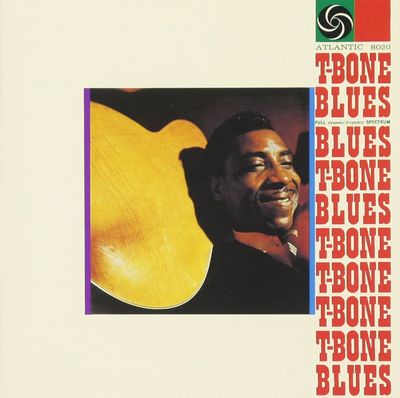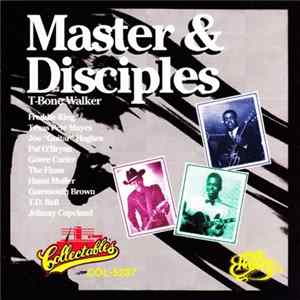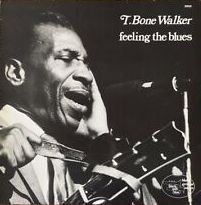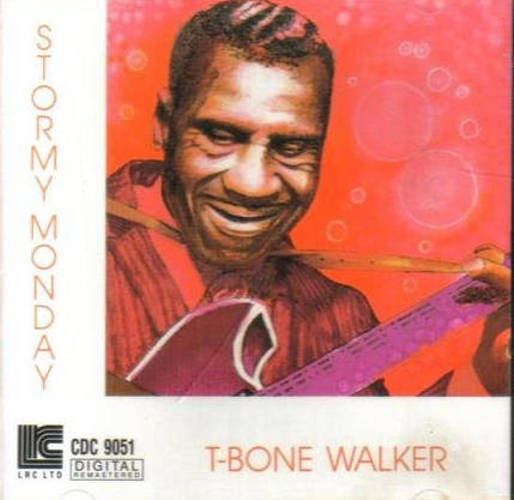Aaron Thibeaux Walker
b. May 28th, 1910 in Linden (Texas)
d. March 16th, 1976 in Los Angeles (California)

THE CHRONOLOGICAL T-BONE WALKER
Classics
December 1929 / 1940 / October 1944 / December 1945
Ses parents Movelia Jimerson et Rance Walker étaient musiciens. Il apprend la guitare avec son beau-père Marco Washington mais aussi le piano, le violon et la mandoline. Sa carrière démarre dans la région de Dallas dans les années 20. Il fréquente notamment Blind Lemon Jefferson - qui semble être un ami de la famille - avec lequel il tourne quelques temps. Il fait ses débuts en 1929 pour Columbia sous le pseudonyme d'Oak Cliff T-Bone en enregistrant "Trinity river blues" et "Wichita Falls blues". En 1934-35, il se marie avec Vida Lee et le couple s'installe à Los Angeles. A la même époque, il perfectionne sa technique à la guitare en suivant l'enseignement de Chuck Richardson (le professeur de Charlie Christian). Walker intègre ensuite l'orchestre de Les Hite en tant que chanteur en 1939-41. En juin 1940, il apparait d'ailleurs sur quelques titres parus sur le label Varsity d'Eli Oberstein. Il passe ensuite quelques temps à Chicago à l'invite du boxeur Joe Louis qui le fait jouer dans son club, le Rhumboogie Cafe. A cette occasion, il grave une poignée de morceaux pour le label éponyme (Rhumboogie) accompagné par l'orchestre de Marl Young (également producteur des séances) : "You don't love me blues", "Mean old world blues". Enfin, en 1944-45, il enregistre aussi pour Swingmaster ("I can't stand being away from you").
His parents Movelia Jimerson and Rance Walker were musicians. He learned the guitar with his stepfather Marco Washington but also the piano, the violin and the mandolin. His career began in the Dallas area in the 1920's. He notably met Blind Lemon Jefferson - who seems to be a friend of the family - with whom he tours for a while. He made his Columbia debut in 1929 under the pseudonym Oak Cliff T-Bone, recording "Trinity river blues" and "Wichita Falls blues". In 1934-35, he married Vida Lee and the couple moved to Los Angeles. At the same time, he perfected his technique on the guitar following the teaching of Chuck Richardson (Charlie Christian's teacher). Walker then joined the Les Hite orchestra as a singer in 1939-41. In june 1940, he also appeared on a few songs released on Eli Oberstein's Varsity label. He then spent some time in Chicago at the invitation of boxer Joe Louis who made him play in his club, the Rhumboogie Cafe. On this occasion, he recorded a handful of songs for the eponymous label (Rhumboogie) accompanied by the Marl Young orchestra (also producer of the sessions) : "You don't love me blues", "Mean old world blues". Finally, in 1944-45, he also recorded for Swingmaster ("I can't stand being away from you").

THE COMPLETE CAPITOL / BLACK & WHITE RECORDINGS
EMI
July 1942 - December 1947
T-Bone signe un contrat d'enregistrement avec Capitol en 1942. Son premier simple (avec le pianiste Freddie Slack) est superbe et met déjà en avant ce jeu de guitare fluide et aérien qui le rendra célèbre. Malheureusement, ces excellents débuts sont interrompus par le Petrillo's ban (grève décidée par le syndicat des musiciens). Après celui-ci, T-Bone peut reprendre le chemin des studios. Grâce à Paul Reiner et Ralph Bass, Walker signe chez Black & White où il est accompagné par l'ensemble de Jack Mac Vea. De nombreux chefs d'oeuvre voient le jour : "No worry blues", "Don't leave me here", "I'm gonna find my baby", "I'm in an awful mood", "T-Bone jumps again", "Call it stormy monday", "Triflin' woman blues", "Hypin' woman blues", "T-Bone shuffle", "Home town blues". Par la suite, les faces Black & White seront rachetées par Capitol. Ce coffret triple CD dresse donc le panorama complet de cette première oeuvre d'un grand maitre de la guitare blues. Il possède également un livret copieusement annoté. Un document indispensable dans toute collection blues.
T-Bone signs a recording contract with Capitol in 1942. His first single (with pianist Freddie Slack) is superb and already highlights this guitar playing fluid and airy that will make him famous. Unfortunately, these excellent beginnings were interrupted by the Petrillo's ban (strike decided by the musicians' union). After this, T-Bone can go back to the studios. Thanks to Paul Reiner and Ralph Bass, Walker signs with Black & White label where he is accompanied by the ensemble of Jack Mac Vea. Numerous masterpieces see the light of the day : "No worry blues", "Don't leave me here", "I'm gonna find my baby", "I'm in an awful mood", "T-Bone jumps again" , "Call it stormy monday", "Triflin' woman blues", "Hypin' woman blues", "T-Bone shuffle", "Home town blues". Subsequently, the Black & White will be acquired by Capitol. This triple CD box set gives thus the complete overview of the first work of a great master of the blues guitar. It also has a copiously annotated booklet. An essential document in any blues collection.

THE COMPLETE IMPERIAL RECORDINGS
EMI
April 1950 - June 1954
Après la superbe période chez Black & White, T-Bone Walker signe chez Imperial - le label de Lew Chudd - pour une collaboration encore une fois inoubliable. Accompagné par d'excellents sidemen comme Big Jim Wynn, Eddie "Lockjaw" Davis, Maxwell Davis, Lee Allen, Herb Hardesty, T.J. Fowler, il donne encore de remarquables moments de guitare incisive et fluide dans une atmosphère entre Blues, Rhythm & Blues et Jazz : "Strollin' with Bone", "Alimony blues", "Life is too short", "I get so weary", "Tell me what's the reason", "Cold cold feeling", "I got the blues", "Love is just a gamble", "High society", "Long distance blues".
After the superb period at Black & White, T-Bone Walker signs with Imperial - Lew Chudd's label - for an unforgettable collaboration once again. Accompanied by excellent sidemen like Big Jim Wynn, Eddie "Lockjaw" Davis, Maxwell Davis, Lee Allen, Herb Hardesty, T.J. Fowler, he still gives remarkable moments of incisive and fluid guitar in an atmosphere between Blues, Rhythm & Blues and Jazz : "Strollin' with Bone", "Alimony blues", "Life is too short", "I get so weary", "Tell me what's the reason", "Cold cold feeling", "I got the blues", "Love is just a gamble", "High society", "Long distance blues".

T-BONE BLUES
Atlantic
April 1955 - December 1957
Toujours au sommet de son art, T-Bone Walker arrive chez Atlantic en 1955 juste après avoir quitté Imperial. Sous la supervision d'Ahmet & Nesuhi Ertegun et Jerry Wexler, il donne en trois séances la quintessence de son blues élégant. Tous les titres sont fabuleux et ce disque est indispensable à toute collection blues : "T-Bone shuffle", "Play on little girl", "T-Bone blues", "Call it stormy monday", "Blues for Marili", "Two bones and a pick" (à trois guitares). Derrière T-Bone, on trouve d'immenses musiciens de blues et de jazz tous remarquablement inspirés : Eddie Chamblee, Jimmy Rogers, Junior Wells, Plas Johnson, Earl Palmer, R.S. Rankin, Barney Kessel. Son jeu de guitare élégant et virtuose - influencé par Charlie Christian et Lonnie Johnson - a marqué de nombreux guitaristes comme Roy Gaines, "Pee Wee" Crayton, B.B. King, Duke Robillard, Clarence "Gatemouth" Brown. Il souffre dès le milieu des années 50 de graves troubles digestifs liés à son alcoolisme (on lui enlève une partie de son estomac en 1955). Malgré ces merveilleuses réussites, sa carrière marque le pas après 1959.
Always at the top of his game, T-Bone Walker arrived at Atlantic in 1955 just after leaving Imperial. Under the supervision of Ahmet & Nesuhi Ertegun and Jerry Wexler, he gives in three sessions the quintessence of his elegant blues. All the songs are fabulous and this record is essential for any blues collection : "T-Bone shuffle", "Play on little girl", "T-Bone blues", "Call it stormy monday", "Blues for Marili", "Two bones and a pick" (with three guitars). Behind T-Bone, there are huge blues and jazz musicians all remarkably inspired : Eddie Chamblee, Jimmy Rogers, Junior Wells, Plas Johnson, Earl Palmer, R.S. Rankin, Barney Kessel. His elegant and virtuoso guitar playing - influenced by Charlie Christian and Lonnie Johnson - has marked many guitarists like Roy Gaines, "Pee Wee" Crayton, B.B. King, Duke Robillard, Clarence "Gatemouth" Brown. From the mid-1950's, he suffered from serious digestive diseases linked to his alcoholism (part of his stomach was removed in 1955). Despite these wonderful successes, his career slowed down after 1959.

THE AMERICAN FOLK BLUES FESTIVAL 1962-1966 vol.1
Hip-O
September 1962
Une belle version de "Don't throw your love on me so strong" gravée pendant la tournée de l'American Folk Blues Festival.
A beautiful version of "Don't throw your love on me so strong" engraved during the tour of the American Folk Blues Festival.

AMERICAN BLUES FESTIVAL
Secret
Rare
Tony's
October 1962


AMERICAN FOLK BLUES FESTIVAL '62
Brunswick
L+R
THE ORIGINAL AMERICAN FOLK BLUES FESTIVAL
Decca
October 1962
Après une décennie au sommet (Black & White, Imperial, Atlantic), T-Bone Walker se retrouve au creux de la vague. Grâce à Willie Dixon et John Lee Hooker, il est engagé sur cette première tournée de l'American Folk Blues Festival produite par les allemands Horst Lippmann et Fritz Rau. Sur cet album, il délivre deux très beaux blues : "I wanna see my baby" et "I'm in love". Excellent showman, il charme le public par son jeu de scène et sa musique et accroit sa popularité en Europe.
After a decade at the top (Black & White, Imperial, Atlantic), T-Bone Walker finds himself at the bottom of the wave. Thanks to Willie Dixon and John Lee Hooker, he is engaged on this first tour of the American Folk Blues Festival produced by germans Horst Lippmann and Fritz Rau. On this album, he delivers two very beautiful blues : "I wanna see my baby" and "I'm in love". Excellent showman, he charms the public with his stage performance and his music and increases his popularity in Europe.

AMERICAN FOLK BLUES FESTIVAL 1962 : LIVE IN PARIS
Frémeaux
October 1962
Dans ce triple CD qui reprend l'intégralité des concerts parisiens de la première tournée de l'American Folk Blues Festival, on trouve une poignée de titres inédits joués par T-Bone Walker. Celui-ci très en forme à la guitare donne d'excellentes versions de "Woman you must be crazy", "Call it stormy monday" et "You don't love me".
In this triple CD which covers all the Parisian concerts of the first tour of the American Folk Blues Festival, we find a handful of unreleased tracks played by T-Bone Walker. In a very good shape, he gives excellent versions of "Woman you must be crazy", "Call it stormy monday" and "You don't love me".

AMERICAN FOLK BLUES FESTIVAL - LIVE IN MANCHESTER
Rhythm & Blues
October 1962
Le concert de Manchester a lieu le lendemain du concert de Paris lors de cette première tournée de l'American Folk Blues Festival. Malgré une qualité sonore issue d'une retransmission radiophonique, on entend T-Bone Walker délivrer de belles versions de "Call it stormy monday" et "My baby is now on my mind".
The Manchester concert takes place the day after the Paris concert on this first tour of the American Folk Blues Festival. Despite sound quality resulting from a radio broadcast, we hear T-Bone Walker deliver beautiful versions of "Call it stormy monday" and "My baby is now on my mind".

WEST COAST MODERN BLUES 1960'S
P-Vine
October 1964
Quatre bons morceaux gravés à Chicago pour le label Modern en octobre 1964 en particulier "Jealous woman" et "Hey hey baby".
Four good tracks engraved in Chicago for the Modern label in october 1964 in particular "Jealous woman" and "Hey hey baby".

WE LOVE THE BLUES
Alan Grant Productions
August 1965





THE TRUTH
Brunswick
MCA
MASTERS & DISCIPLES
Home Cooking
Collectables
WELL DONE
Home Cooking
I DON'T BE JIVIN'
Bear Family
September 1966 / 1966
T-BONE STANDARD TIME
Edsel
September 1966 / 1970
Ces recueils reprennent de manière indistincte les séances de T-Bone Walker pour les labels Home Cooking et Jet Stream notamment pour le producteur Huey P. Meaux. Ces morceaux apparaissent très inégaux malgré de beaux moments de guitare comme dans sa reprise de "Reconsider baby" ou dans "I ain't your fool no more", "Let your hair down", "She's my old time used to be". Ces recueils compilent ce matériel en dépit du bon sens : certains titres sont modifiés d'une édition à l'autre, raccourcis, overdubbés, avec parfois des rendus sonores différents. On trouve aussi quelques prises alternatives dans certains d'entre eux. Il convient donc d'être circonspect.
These collections indistinctly repeat the sessions of T-Bone Walker for the Home Cooking and Jet Stream labels, in particular for the producer Huey P. Meaux. These pieces appear very uneven despite the beautiful moments of guitar as in his cover of "Reconsider baby" or in "I ain't your fool no more", "Let your hair down", "She's my old time used to be". These collections compile this material in spite of common sense : some titles are modified from one edition to another, shortened, overdubbed, with sometimes different sound renditions. There are also some alternative takes in some of them. It is therefore advisable to be cautious.

JAZZ AT THE PHILARMONIC IN LONDON
Pablo
November 1966
Pour le célèbre concert organisé par Norman Granz, T-Bone Walker joue sur scène trois titres assez plaisants aux côtés des jazzmen Dizzy Gillespie, Clark Terry, James Moody, Zoot Sims.
For the famous concert organized by Norman Granz, T-Bone Walker performs three quite pleasant tracks on stage alongside jazzmen Dizzy Gillespie, Clark Terry, James Moody, Zoot Sims.

STORMY MONDAY BLUES
Bluesway
Stateside
BGO
May 1967
Avec le regain de popularité que lui a apporté l'American Folk Blues Festival, T-Bone Walker signe chez Bluesway avec le producteur Bob Thiele. Encore une fois, le bluesman se montre parfaitement en forme et son jeu de guitare toujours étincelant. Seul défaut : un format très court de 30 minutes. "I'm gonna stop this nite life", "Cold hearted woman", "Confusion blues", "Flower blues", le funky "Every night I have to cry" (avec l'appui du guitariste Mel Brown) sont des titres essentiels.
With the renewed popularity brought by the American Folk Blues Festival, T-Bone Walker signed to Bluesway with producer Bob Thiele. Again, the bluesman shows himself perfectly in shape and his guitar playing always sparkling. The only flaw : a very short 30-minute format. "I'm gonna stop this nite life", "Cold hearted woman", "Confusion blues", "Flower blues", the funky "Every night I have to cry" (with the support of guitarist Mel Brown) are essential titles.

THE GREATEST JAZZ CONCERT IN THE WORLD
Pablo
June or July 1967
Enregistré pendant une tournée Jazz at the Philarmonic supervisée par le producteur Norman Granz, T-Bone joue "Woman you must be crazy" et "Stormy monday" avec les jazzmen Oscar Peterson, Paul Gonsalves et Johnny Hodges.
Recorded during Jazz at the Philharmonic tour supervised by producer Norman Granz, T-Bone plays "Woman you must be crazy" and "Stormy monday" with the jazzmen Oscar Peterson, Paul Gonsalves and Johnny Hodges.

FUNKY TOWN
Bluesway
Stateside
BGO
February 1968
Second album pour le label Bluesway de nouveau avec le producteur Bob Thiele. Les musiciens sont les mêmes que sur le précédent "Stormy monday blues". Ici aussi l'intensité et l'inspirations sont au rendez vous. On retient les remarquables faces "Goin' to funky town", "Party girl", "Jealous woman", "Long skirt baby blues", "I'm in an awful mood".
Second album for the Bluesway label again with producer Bob Thiele. The musicians are the same as on the previous "Stormy monday blues". Here too the intensity and inspirations are there. We can point out the remarkable sides "Goin' to funky town", "Party girl", "Jealous woman", "Long skirt baby blues", "I'm in an awful mood".







FEELING THE BLUES
Black & Blue
I WANT A LITTLE GIRL
Delmark
November 1968
Séance française dans laquelle T-Bone Walker est notamment accompagné du saxophone Hal Singer et du batteur S.P. Leary. Pas aussi puissant et inspiré que sur les faces Bluesway, le programme demeure néanmoins très consistant avec des morceaux comme "I hate to see you go", "Feeling the blues", "Leaving you behind" ou encore "Ain't this cold baby" dans lequel il s'asseoit derrière le piano.
French session in which T-Bone Walker is notably accompanied by saxophone Hal Singer and drummer S.P. Leary. Not as powerful and inspired as on the Bluesway sides, the program nevertheless remains very consistent with songs like "I hate to see you go", "Feeling the blues", "Leaving you behind" or even "Ain't this cold baby" in which he sits behind the piano.



GOOD FEELIN'
Polydor
Verve
Maison de Blues
November 1968
Autre séance française capturée quelques jours après la précédente. Notons la participation du saxophoniste camerounais Manu Dibango. On entend ici une nette influence Soul-Funk dans cette tracklist qui semble parfois bancale et hétérogène.
Another french session captured a few days after the previous one. Note the participation of cameroonian saxophonist Manu Dibango. Here we hear a clear Soul-Funk influence in this tracklist which sometimes seems wobbly and heterogeneous.

EVERYDAY I HAVE THE BLUES
Bluestime
Ace
August 1969
T-Bone Walker retrouve ici le producteur Bob Thiele (et son label Blues Time) pour cet album à la coloration Soul-Funk. Comme pour "Good feelin'", le programme semble un peu inégal avec de très bons moments comme "Vietnam" ou "Cold cold feeling".
T-Bone Walker finds here producer Bob Thiele (and his Blues Time label) for this Soul-Funk album. As for "Good feelin'", the program seems a bit uneven with some really good moments like "Vietnam" or "Cold cold feeling".


SUPER BLACK BLUES
Bluestime
Ace
October 1969
De nouveau sous l'égide de Bob Thiele et de son label Bluestime, ce disque propose l'association de T-Bone Walker, Big Joe Turner et d'Otis Spann. Il est constitué de quatre longs morceaux qui s'apparentent à des jam-sessions en totale liberté. Un album mineur tantôt sympathique, tantôt somnolent.
Again under the leadership of Bob Thiele and his Bluestime label, this album offers the association of T-Bone Walker, Big Joe Turner and Otis Spann. It consists of four long titles that are similar to free jam sessions. A minor album sometimes nice, sometimes sleepy.



STORMY MONDAY BLUES
Wet Soul
Bellaphon
Charly
Atlas
Orbis
1970
Séances pour le producteur Huey P. Meaux et le label Wet Soul. Malgré la présence occasionnelle de Johnny Copeland à ses côtés, la musique semble ici bien peu inspirée, en roue libre sans véritable consistance. On peut retenir néanmoins "Glamour girl" ou l'instrumental "Louisiana bayou drive". A conseiller avant tout aux fans confirmés. On note qu'à la même époque, il participe à la tournée de l'American Folk Blues Festival de 1970. Mais, complètement saoul la plupart du temps, il ne figure même pas sur les différents recueils de la tournée.
Sessions for the producer Huey P. Meaux and the Wet Soul label. Despite the occasional presence of Johnny Copeland at his side, the music here seems very uninspired, coasting without real consistency. We can nevertheless retain "Glamour girl" or the instrumental "Louisiana bayou drive". To advise above all to confirmed fans. We notice that at the same time, he participated in the American Folk Blues Festival 1970 tour. But, completely drunk most of the time, he does not even appear on the various records issued from the tour.

BLUES MEN
LRC
?
Sept morceaux live de T-Bone Walker qui datent probablement de la fin des années 60 / début des années 70. Les musiciens restent non-identifiés mais la qualité sonore est satisfaisante. Ambiance jazzy sympathique mais un peu ennuyeuse aussi.
Seven live tracks by T-Bone Walker which probably date from the late 60's / early 70's. The musicians remain unidentified but the sound quality is satisfactory. Nice jazzy atmosphere but a bit boring too.

SUPER BLACK BLUES vol.2
Bluestime
Ace
May 1970
Concert au Carnegie Hall de New York réunissant Big Joe Turner, T-Bone Walker, Leon Thomas et Eddie "Cleanhead" Vinson. T-Bone prend deux morceaux en leader : "Stormy monday blues" et "Sail on".
Concert at Carnegie Hall in New York bringing together Big Joe Turner, T-Bone Walker, Leon Thomas and Eddie "Cleanhead" Vinson. T-Bone takes two tracks as a leader : "Stormy monday blues" and "Sail on".


BLUES AVALANCHE
Chess
Bellaphon
June 1972
Apparition de T-Bone Walker sur la scène du fameux festival de Montreux en juin 1972 aux côtés de Muddy Waters.
Appearance of T-Bone Walker on the stage of the famous Montreux festival in june 1972 alongside Muddy Waters.

FLY WALKER AIRLINES
Polydor
June 1972
Ce disque recueille son concert sur la scène du festival de Montreux (même jour que "Blues avalanche" dans lequel il joue avec Muddy Waters). Certains passages semblent très approximatifs et les musiciens bien peu convaincants. Parfois, T-Bone laisse sa guitare pour s'asseoir derrière le Fender Rhodes.
This record collects his concert on the stage of the Montreux festival (same day as "Blues avalanche" in which he plays with Muddy Waters). Some moments seem very approximate and the musicians very unconvincing. Sometimes T-Bone leaves his guitar to sit behind the Fender Rhodes.




STORMY MONDAY
LRC
Laserlight
TOP JAZZ
Sarpe
1972
Contrairement à ce qu'affirme certaines éditions, ce concert européen a été capturé en 1972 et non en 1968. T-Bone Walker n'est plus au meilleur de sa forme. Il laisse certaines parties de guitare à Paul Pena et joue de l'orgue par moments. Très inégal et beaucoup de longueurs.
Contrary to what some editions claim, this european concert was captured in 1972 and not in 1968. T-Bone Walker is no longer at his best. He leaves some guitar parts to Paul Pena and plays the organ at times. Very uneven and a lot of lengths.


AMERICAN FOLK BLUES FESTIVAL '72
Atlantic
L+R
October 1972
Troisième participation à la tournée de l'American Folk Blues Festival pour T-Bone Walker (qui s'assied derrière les claviers laissant la guitare à Paul Pena). Deux titres peu convaincants dont l'instrumental "Goin' back to church".
Third participation in the American Folk Blues Festival tour for T-Bone Walker (who sits behind the keyboards leaving the guitar to Paul Pena). Two unconvincing tracks including the instrumental "Goin' back to church".

VERY RARE
Reprise
1973
Dernier album de T-Bone Walker désormais bien diminué par des ennuis de santé dûs à son alcoolisme. D'ailleurs, il ne fait que chanter (à part 1 ou 2 titres) sur ce disque. Pour lui rendre hommage, les producteurs Jerry Leiber et Mike Stoller ont réuni autour de lui un aéropage impressionnant de musiciens réputés comme Charles Brown, James Booker, David "Fathead" Newman, Dizzy Gillespie, Zoot Sims, Gerry Mulligan, Wilton Felder, Michael Omartian. Une belle réalisation - forcément hétérogène - entre Blues, Jazz et Soul dont on peut retenir "Evening", "The come back", "Everyday I have the blues", "Fever", "Stormy monday". Après une attaque en 1974 qui le diminue fortement, il décède en mars 1975 des suites d'une pneumonie.
T-Bone Walker's latest album now much diminished by health problems due to his alcoholism. Moreover, he only sings (apart from 1 or 2 titles) on this album. To pay tribute to him, producers Jerry Leiber and Mike Stoller have gathered around him an impressive aeropage of renowned musicians such as Charles Brown, James Booker, David "Fathead" Newman, Dizzy Gillespie, Zoot Sims, Gerry Mulligan, Wilton Felder, Michael Omartian. A great achievement - necessarily heterogeneous - between Blues, Jazz and Soul in which we can point out "Evening", "The come back", "Everyday I have the blues", "Fever", "Stormy monday". After an attack in 1974 which greatly weakened him, he died in march 1975 of consequences of pneumonia.